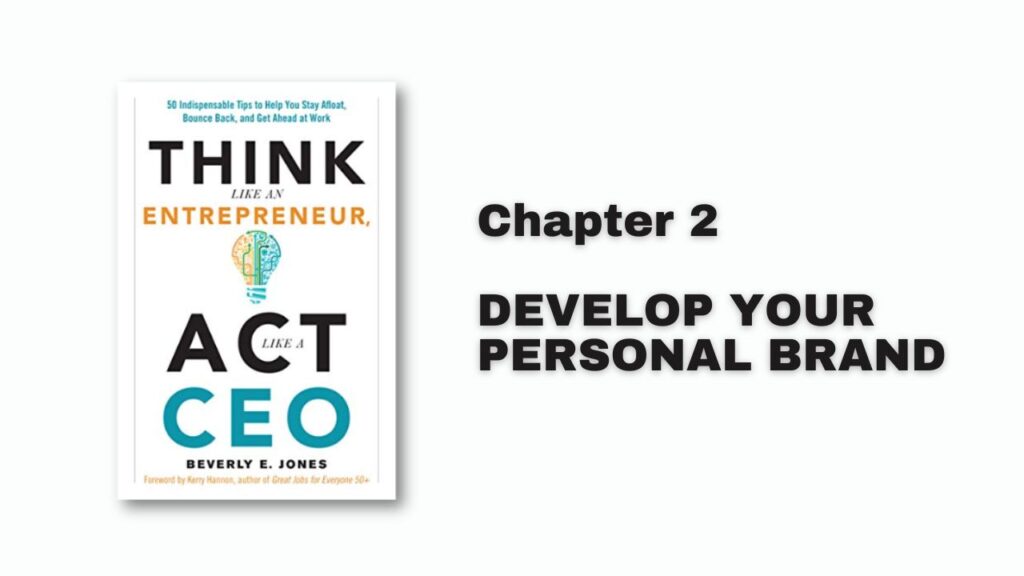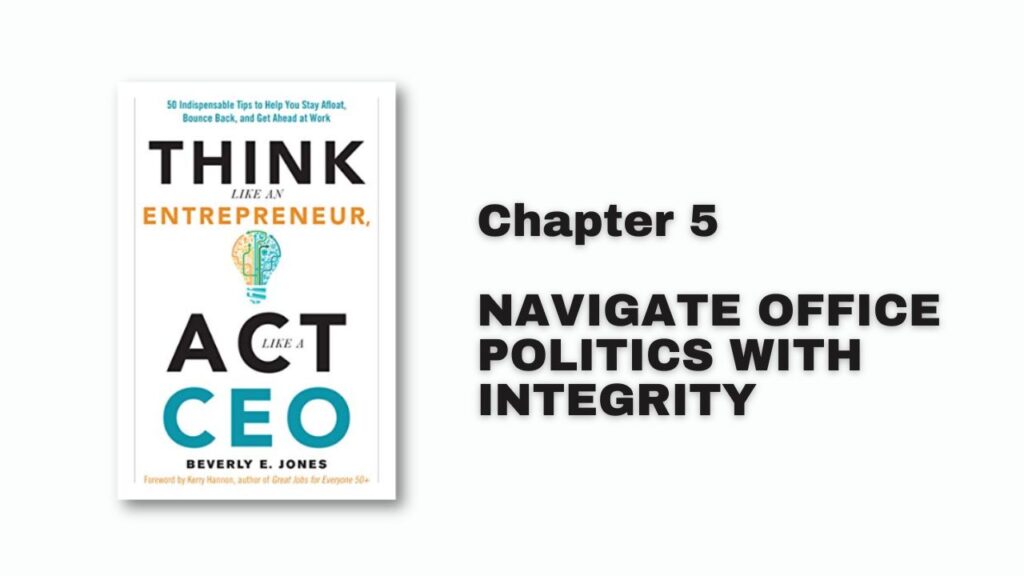Listen in Audio Format
“Think Like an Entrepreneur, Act Like a CEO” by Beverly E. Jones is a practical guide aimed at helping professionals at all stages of their careers develop entrepreneurial thinking and leadership skills. The book offers actionable advice on how to navigate challenges, build resilience, and make smart decisions that can lead to success in the workplace.
Introduction: The Changing World of Work

The book starts by acknowledging that the world of work is constantly evolving. Jobs that were once secure are no longer guaranteed, and success now depends on adaptability, continuous learning, and the ability to think like an entrepreneur. This means being proactive, innovative, and taking charge of your own career development.
To thrive in today’s workplace, you need to blend entrepreneurial thinking with the strategic actions of a CEO. This approach helps you navigate your career more effectively, whether you’re an employee, a manager, or running your own business.
Chapter 1: Embrace an Entrepreneurial Mindset

Having an entrepreneurial mindset means being open to change, looking for opportunities, and being willing to take risks. Jones explains that this mindset isn’t just for business owners; it’s essential for anyone who wants to succeed in their career. It involves being proactive, creative, and constantly seeking ways to add value.
Start by identifying areas in your job where you can be more proactive. Look for problems that need solving or processes that could be improved. By taking the initiative to address these issues, you demonstrate leadership and entrepreneurial thinking.
Chapter 2: Develop Your Personal Brand

Your personal brand is how others perceive you in the workplace. It’s about building a reputation based on your skills, values, and the way you interact with others. Jones emphasizes that developing a strong personal brand can help you stand out and open up new opportunities.
Think about what you want to be known for at work. Is it your problem-solving skills, your ability to lead, or your creativity? Start showcasing these strengths in your everyday tasks and make sure your online presence, like LinkedIn, reflects your personal brand.
Chapter 3: Build a Network That Works

Networking is not just about making connections; it’s about building meaningful relationships that can support your career. Jones explains that a strong network can provide advice, opportunities, and support throughout your career. She advises being intentional about your networking efforts.
Reach out to colleagues, industry peers, and mentors regularly, not just when you need something. Offer help when you can, and stay in touch to maintain these relationships. Attend industry events, join professional groups, and use social media to expand your network.
Chapter 4: Manage Your Time Like a CEO

Time management is crucial for success. Jones compares managing your time to managing a business—you need to prioritize, delegate, and focus on what matters most. She provides tips on how to avoid common time-wasting habits and how to create a more productive work routine.
Start by identifying your top three priorities for each day. Focus on completing these tasks before moving on to less important ones. Learn to say no to activities that don’t align with your goals, and delegate tasks that others can handle.
Chapter 5: Navigate Office Politics with Integrity

Office politics are a reality in most workplaces, but Jones advises handling them with integrity. Understanding the power dynamics and knowing how to navigate them can help you avoid conflicts and advance your career without compromising your values.
Stay aware of the dynamics in your workplace, but don’t get involved in gossip or backstabbing. Build alliances based on mutual respect and shared goals. If conflicts arise, address them professionally and focus on finding solutions rather than placing blame.
Chapter 6: Learn from Setbacks and Failures

Setbacks and failures are inevitable in any career, but how you respond to them can make all the difference. Jones encourages viewing failures as learning opportunities. By analyzing what went wrong and what you can do differently, you can bounce back stronger.
When you experience a setback, take some time to reflect on what happened. What could you have done differently? What did you learn? Use these insights to make adjustments and improve your approach in the future.
Chapter 7: Lead with Confidence

Whether or not you have a formal leadership role, leading with confidence is essential for career success. Jones explains that confident leaders inspire trust and motivate others. She offers strategies for building confidence, such as continuous learning and taking on leadership roles in projects or teams.
Start by taking on small leadership roles, like leading a meeting or heading a project. As you gain experience, your confidence will grow. Continuously seek feedback and work on improving your skills.
Chapter 8: Innovate and Stay Relevant

In today’s fast-paced world, staying relevant requires continuous innovation. Jones encourages readers to keep learning, stay curious, and be willing to adapt to new technologies and trends. Innovation isn’t just about inventing new products; it’s also about finding better ways to do things.
Dedicate time each week to learning something new, whether it’s a skill, a new technology, or a trend in your industry. Look for ways to apply what you’ve learned to your current role to improve efficiency or solve problems.
Chapter 9: Build Resilience for the Long Haul

Resilience is the ability to bounce back from challenges and keep going in the face of adversity. Jones explains that resilience is key to long-term success because it helps you stay focused and motivated even when things get tough.
Practice self-care to maintain your physical and mental health. This includes getting enough sleep, exercising, and finding ways to manage stress. Surround yourself with supportive people who can help you stay positive during difficult times.
Chapter 10: Make Smart Career Moves

Your career is a journey, and making smart moves along the way is essential for growth. Jones advises being strategic about your career decisions, whether it’s taking a new job, asking for a promotion, or deciding to stay in your current role.
Regularly assess your career goals and progress. Are you where you want to be? If not, what steps can you take to move closer to your goals? Consider seeking advice from a mentor or coach to help you make informed decisions.
Conclusion: You’re the CEO of Your Career

The book concludes with the reminder that you are the CEO of your own career. This means taking full responsibility for your professional growth and success. By thinking like an entrepreneur and acting like a CEO, you can navigate your career with confidence, resilience, and purpose.
Success doesn’t just happen—it’s the result of careful planning, continuous learning, and proactive effort. Treat your career like a business, where you are both the CEO and the product. Make decisions that align with your long-term goals and invest in yourself to ensure ongoing success.
“Think Like an Entrepreneur, Act Like a CEO” is a practical guide that encourages professionals to take control of their careers by thinking strategically and acting with purpose. It’s about being proactive, building a strong personal brand, and continuously learning and adapting to stay ahead in today’s competitive job market.
Read This Complete Book

Read More Books Like This
Think Like a Monk
By Jay Shetty
Unfu*k Yourself
By Gary John Bishop
22 Immutable Laws of Marketing
By AL Ries & Jack Trout
The Subtle Art of Not Giving a Fu*k
By Mark Manson
The Secret
By Rhonda Byrne






